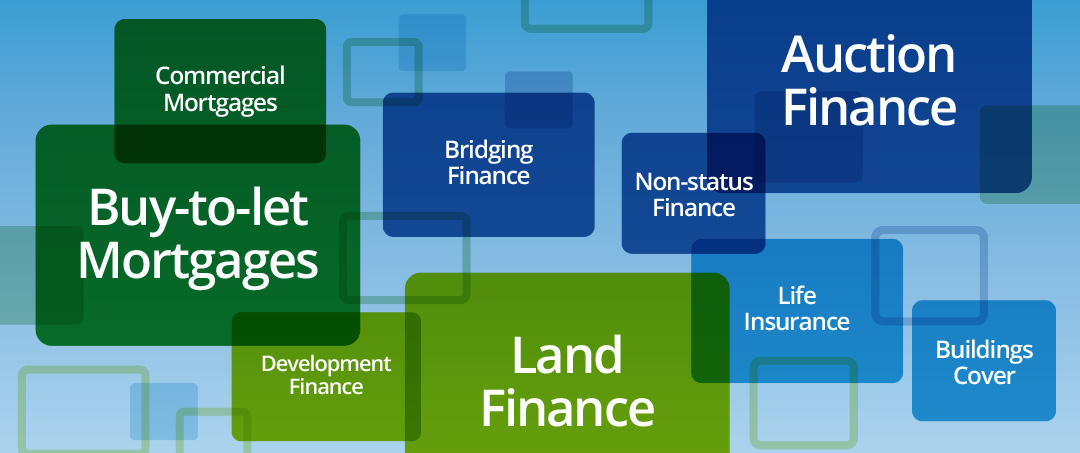How to finance your next property investment?

Finding your perfect investment property is one thing, but how are you going to fund it?
Whether you are purchasing a residential, commercial or semi-commercial property there are a variety of ways to get finance for it. There are long-term finance options for those with well-thought out business plans, and for those that need a quick cash boost to secure that property, there are bridging loans available. Whether you're investing in commercial property, developing land or flipping a property, there are loans to suit all projects.
Increasingly, lenders tend to work on a case-by-case basis, so speak to a specialist mortgage broker to see what fits your needs.
Most property developers and investors will not have huge sums of money lying around to buy properties outright, and will need to borrow to further their investments. Fortunately there are lenders out there who are willing to offer finance to people in a wide range of circumstances and for a number of different projects, whether you are considering converting a residential unit into a semi-commercial property, or splitting a large house into an HMO, there is likely going to be a specialist lender to meet your needs.
Buy to let finance options
Buy to let is one of the most popular ways to invest in property, for people both new to the market and more seasoned portfolio landlords. There are a couple of ways to finance BTLs.
Buy to let mortgages
In contrast to a traditional mortgage, BTL lenders will require a larger deposit of around 25% or more, and interest rates can be higher. You will also be required to ensure the rent will cover up to 145% of the mortgage repayments, due to stricter regulations that have come into force over the past few years, although some lenders will ask for 125%. They are also more likely to be arranged on an interest-only basis, which are now less common with mortgages on residential properties.
However, they can be easily to obtain than residential mortgages, because lenders will calculate their returns based on the local rental market, rather than your personal income.
Business loans for portfolio landlords
If you are a landlord with four or more buy-to-let properties, you may want to consider business loans or commercial investment mortgages as your portfolio grows. Many high street lenders impose limits on buy to let mortgages, and might deem anyone with around ten or more mortgages as high-risk.
Commercial lenders can help where high streets cannot, and offer bespoke packages, tailor-made to your projects. You may have a wider range of properties to choose from, as some high-streets lenders will not grant mortgages to ones they deem more risky, such as properties above shops or flats in tower blocks.
Bear in mind that most commercial options have stricter lending criteria, so prepare well-thought out business plans and the documents relevant to the type of mortgage you are requesting.
An experienced broker can help you to negotiate terms with your lender, and help you agree the best price plan. Unlike some residential properties, you'll be buying chain-free, which may help you to negotiate a lower price.
Development finance options
The nature of obtaining finance for property development means it is more complex than funding BTLs or residential properties. You are essentially asking for funding for an incomplete product and you have to convince the lender that you're going to make it profitable. Be prepared for surveyors to be stricter on valuations.
However, property developers can pick and choose from a number of options depending on factors such as how far along you are, what kind of refurbishment you're intending to do the property and the type of property it is.
There are three main types:
Light redevelopment or refurbishment:
Projects with a short turnaround time. Funding for when you want to change the interiors from walls to ceiling, such as installing a more up-to-date a kitchen or bathroom, or modernise the aesthetics to make it more sellable.
Heavy renovation/refurbishment
Work that's needed on the property to make it habitable, rather than more aesthetically pleasing. Includes structural work, rewiring, rebuilding walls, extensive plumbing work and extensions. Borrowers will want to consider longer-term bridging financing to cover projects like this, or a short-term commercial mortgage.
Ground-up development:
Much larger projects which can be anything from purchase and development of land, to converting an entire property. It will require a number of professionals to work on the project and finance will be on a longer-term basis. Generally the loan is released in stages during different parts of project completion. They can be funded with development finance that is split to cover both the cost of the land and the building. Purchases such as this are more similar to traditional BTL mortgages, in that the borrower have to have their own cash to complete some of the project costs.
It could be that you already own the land outright. In this case the lender is likely to agree to funding 100% of the building costs. Nothing is certain though, and you'll need to speak to a broker before you have an idea of what you will be entitled to borrow, for how long, and under what terms and conditions.
Bridging loans
A short-term finance option, ideal for an investor who needs to act quickly, perhaps to buy at auction. They can be accessed quickly, in some cases in as little as 48 hours, usually within a few weeks. They usually last a few months, but in some cases can be extended. Once the bridging loan is paid off, a longer-term mortgage can be taken out. Bridging loans are an option for a range of project developments, either residential or commercial - from extensive ground work property to refurbishing converting a warehouse.
There are specific bridging loans for light renovation projects, used to cover the cost of the building work. They can often be converted into a mortgage with relative ease.
When applying for a bridging loan, you should consider the higher interest rates alongside admin and arrangement fees. There may be flexibility in how the interest is paid off, as some lenders will agree to the interest being paid off at the end. Have your exit strategy prepared in advance so you can discuss how you will pay the loan off in full at the end of the term. It's important to establish this in order to be successful with your application.
Commercial property investment
Commercial property investment is becoming an increasingly popular alternative to residential buy-to-lets, due to the generally higher yields and lower stamp duty. However, approval rates are slightly lower as lenders still operate on the side of caution when it comes to commercial property. Buyers will need to produce a deposit of around 25%.
An owner-occupier mortgage can offer lower rates than other types of commercial mortgage, and the terms can be longer. If you have a good trading record, some lenders can offer up to 100% of the purchase price. However, if you are planning to rent the commercial space out to another business, you'll need to apply for a commercial investment mortgage.
Land mortgages
It can be trickier to find a loan to buy land or refinance a development as there are fewer funders in the market. Bu there are finance options available and an experienced broker will help you find the best option for land purchase. You'll need to establish a few things to determine which lender will be right for your project, such as whether planning permission will be possible for the type of development on the land, and whether it is suitable for building on. Short-term loans are popular for this type of development project and there are specific self-build mortgages available for that purpose.
Again, it's best to have a clear business plan in place with any contingency plans laid out, and a clear exit strategy.
Crowdfunding
Some investors that have been turned down for other types of loan may want to consider crowdfunding for their development project, however this is a relatively new way to raise finance. An experienced broker will talk to you about your options before you make any decisions.
Contact us now to discuss your personal options, Revolution Finance Brokers specialise in commercial and residential finance in Essex, Kent, London and Hertfordshire.
Related Posts
Ask the Expert
Mortgage Brokers




